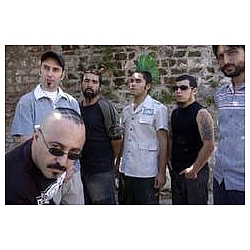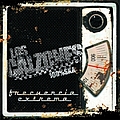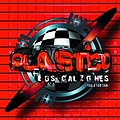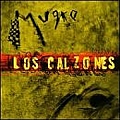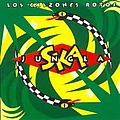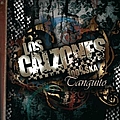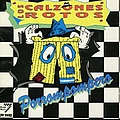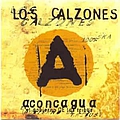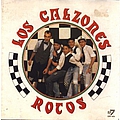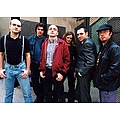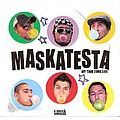Los Calzones Biography
Los Calzones (the underpants) from Argentina is a a Ska / Rock group which is a follow-up to Los Calzones Rotos (the ragged underpants) started out in Buenos Aires in 1988. Inspired by the like of Madness, Bad Manners, The Specials, The Skatalites and The Selecter at a time when ska was out of fashion. Nevertheless, the group went on and founded their own label to show their independence. Halfway through1991, Los Calzones Rotos, their debut, appeared with hits like “Ska del Novio” and “Skabaret” which took them massively to the media and to their audience. They made shows everywhere and their first Video-clip “Ska del Novio” was one of the most important in 1992. So, they made tours through the whole country. At the beginning of 1993 they edited their second production called Porrompompero that gave them a bigger audience through new hits such us “Cuidáte la cola”, “Porrompompero” and “Todo lo que duele”. By that time, as they played constantly, they could record a prestigious instrumental track “Anillaco No E´Nesario” which made them different from other groups of the Argentine ska movement. The sales then were beyond all expectations as they obtained the platinum disc in Argentina and the gold disc in Chile. In 1995, appeared their third album, Jungla Ska. recorded during the summer and finishedin Los Angeles by Wally Traugoth, a veteran guru who had worked for Pink Floyd and Soul Asylum, among others. They filmed the Video-clip “No te calles” (a kind of hymn that the group redefined with the sentence “ El silencio es el peor de los consuelos” –silence is the worst consolation-) with explicit images and directed again by Alfredo Lois. The tours around Mendoza, Bariloche, the north and the south of Argentina with a great audience and the edition of the material in Uruguay, Paraguay, Bolivia, Chile, Ecuador and Colombia, consolidated Los calzones definite rise in both, artistic and commercial aspects. It was a terrific year for them. At the beginning of 1996, they intensified their rehearsals. By February in Chile appeared for 25,000 people in numerous cities and the same mass at the ´96 Festival de la Cancian de Viña de Mar. They faced the press that couldn’t stand their dedication to the missing, their rejection to the Latin-American dictators and to the nuclear tests in the Pacific Ocean. The public supported the only group capable of saying everything as it is and being, at the same time, the revelation of the event. After the success in VIiña, they prepared their material in Lomas. They decided that they would be “Los Calzones” forever, without the nickname “Rotos”. Once they had selected the songs, they flew to LA to record their forth album, Aconcagua (whose name was part of a legend written by the group) at N.R.G, Mad Dog and Rusk Sound studio. They created a convincing work that included names such as Maria Soledad Morales and Diego Armando Maradona. The album appeared during the summer ´96, ´97 and in a few days it became the favourite of almost all the radios. In such a way the hit “te sigo” turned into a terrific video-clip in record time. It was directed by Alfred Lois and filmed in 16mm at Banfield's Stadium, next to where the band began playing. No doubt, it was a great way to begin their ninth year of existence. In the meantime, the band went on making shows during summer through the whole Atlantic Coast. They inaugurated the denomination Guillatun (in regard to the annual ceremony where tribes meet to beg the gods for good harvests and harmony among towns). From then on, they didn’t stop until they made 184 shows during the year. They blessed their fans making tours through out the whole country and welcoming graduating contingents in San Carlos de Bariloche where they also filmed the video ACONCAGUA. The third track was directed by the prestigious Diego Kaplan. The same year, they participated for the second time in an international compilaton with the song JUNGLE SKA (from their third album). The band contributed with Stay Sharp II, supporting the so-called Skinheads Sharp (a minority politically correct and diametrically opposed to the violent and extreme right model that is known around here). It was a good way to be alert against the non-information that is around and a showing of Los Calzones´ international consensus. In 1998, the band duplicated its work, as it wanted to reach everybody in Argentina. A new coast tour, a new national tour, but this time free and in the open air (with peaks of 15 thousand assistants) and a new establishment in Bariloche helped Los Calzones break their own record. They reached the terrific number of 270 shows. Then, they went on working hard on what would be their fifth and most powerful album. As a result of their personal style maturity, (shown both in their lyrics and musical evolution), Los Calzones “put in a mixer” their social analysis, the sate of things, their love for SKA, their ambition to denounce anyone who is detrimental to people (politicians, government officers, and other weeds of the national corruption) and used everything to create new songs. In such a way they began 1999. After finishing their contract with Polygram and signing a new one with Sony (in only a week), the tireless SKA group went to LOS ANGELES where, as usual, they prepared their fifth album. With the help of Gustavo Borner they went through the best studios of the city of lights until “MUGRE” was ready. In March MUGRE was done and brought “Milonga Ska”, an energizing and “arrabalera” (vulgar) fusion that quickly became one of the most heard songs together with “Levantes las copas”, future hit for public celebrations. As Los Calzones don’t rest, they started moving again. Although the time they spent working on MUGRE prevented them frome breaking their record of shows, they divided again their time between their usual work in Bariloche and the third edition of “GUILLATUN TOUR”. Apart from that, they came to Buenos Aires to share the stage with Bad Manners, one of the most important ska bands. By the end of the year, they had made 184 shows. The beginning of 2000 was full of presentations: 100,000 people attended 20 shows throughout the Atlantic Coast from San Clemente to Monte Hermoso and the “GUILLATUN TOUR”, that is part of Los Calzones´s life, was bigger in both production and audience. While they traveled km by km, they were planning their sixth album. This time, the idea was to dedicate the album to the 80s and to the rock bans that were successful at that glorious time of the national music. To do so, they worked in Lomas de Zamora during October and November and by December everything was ready to begin to record the album. They celebrated Christmas in Bariloche where they also made some shows. In February they began the sessions and a guests parade, first at Panda studio in Buenos Aires and then at Igloo Music studio in Los Angeles. One by one the guests who had been protagonists of that glorious time worked on the album: Gustavo Ceratti in the song “En la ciudad de la furia”, Stuka (guitar player from Los Violadores) in “Uno, dos ultraviolento”; Andrés Calamaro and Daniel Melingo (both ex Abuelos de la Nada) in “Así es el calor”; Julio Moura (Voice and guitar player from Virus) in "Hay que salir del agujero interior"” Lee Chi (bass player from Los Brujos) in “Kanishka"; Pablo Pandolfo, Claudio Cornelio (singer and battery player from Don Cornelio y la zona) and Alejandro Lerner in “Ella vendrá”; Pablo Guyot with “La calle es su lugar”; Juan Velázquez (singer from Los Intocables) in “Los criminales Sudamericanos” and even Búster Bloodvessel (Fatty) (singer from Bad Manners who recorded a duet, “Yo quiero morirme acá” from Los fabulosos cadillacs). That song was a kind of hymn for Los Calzones. At Bonus Tracks time, Antonio Tarragó Ros y Tukuta Gordillo participated in “Llamada de Tilcara”, “El humahuaqueño” and “El Toro” and Jasón Freese (Mighty mighty Bosstones) participated in “El Rey”. At the beginning of the 80s, it was said that the “plastic time of rock” was starting. After getting all those celebrities together in an album, there was no better name for that album than Plastico. It was on sale by May 2001 through Warner Music and in short time it became gold disc. The first track was “Yo quiero morirme acá” that immediately was highly ranked on TV and radio thanks to the clip directed by Juan Valdana. As soon as they finished, they visited 17 Argentine provinces with GUILATUN TOUR 2001. 250,000 people went to the 32 free open-air shows. Back to Bariloche, they made their sixth consecutive season in that city. The second track had also its video clip. “Ella vendrá” was directed by Juan Valdana and was shot in three Argentine provinces with great success. Soon after, they presented Plastico in Buenos Aires and for the first time at Cemento (an emblematic place where the most important Argentine rock stars played). The amount of people was beyond all expectations. Then, they could do what no other Argentine band could: make a show on Malvinas Islands. Such a historic feat was on November 8th, 2001 in Town Hall a place in Puerto Argentino (Stanley) where Los Calzones played 10 new songs and a lot of hits from their 10-year career for lots of kelpers. It was such a successful show that they made another one before going to Río Gallegos to continue with the second part of the national tour. After a few months, Plastico had a new cut (the third one). It was the song “Uno, dos Ultraviolento”. Warner Music edited the album in Spain, Mexico, Chile, Peru, Colombia and Central America. They finished the year in Bariloche and in February 2002, they started a promotional tour through Chile, Peru, Colombia, Venezuela, Puerto Rico, Costa Rica, USA and Mexico. Then, they edited their third video-clip (forth cut form their CD) “Uno, dos ultraviolento” which was entirely shot at Devoto´s prison and they also got a Japanese edition of the album that included two bonus tracks: “Yo quiero morirme acá” (Malvinas Islands) and “Uno, dos ultraviolento” in demo version. Plastico was also edited in Europe. The promotional tour was around some Latin-American countries and also in Spain where they were welcomed with much interest. In summer 2003 they said goodbye to their sixth album with the “Guillatun Solidario” through which they collected non-perishable food in every city for school dining rooms. That act distinguished Los Calzones from the rest and they were congratulated by Municipio Urbano de la Costa for having got 12 trucks full of food with a record of 200,000 people at the shows. They became in such a way the most important Argentine group of summer 2003. In March, the public is informed about “Frecuencia Extrema”, future 7th band’s album and immediately they started a new tour through USA, Puerto Rico and Mexico until mid May. In June, they made a show in Buenos Aires at Niceto. There, they sang some songs from the new album. They let their audience vote the songs they wanted for the live show on their official site. The show had “Nuevas Raíces” as a special guest and Palo Pandolfo (ex singer from Don Cornelio and Los Visitantes) as guest in the song “Ella vendrá” from their album Plastico. After the successful show in Buenos Aires, they started their seventh consecutive season in San Carlos de Bariloche until mid June when they left to Puerto Rico, Mexico and USA. There, they concentrated at Igloo Music studio to record their new album together with Gustavo Borner who was again the engineer. This time there were no guests but a grate sound they never had before. Frecuencia Extrema has twelve songs and in March 2004 will be edited for a big audience throughout the world now including Europe. In mid 2007 their latest offering Tanguito was recorded in Los Angeles. Has thirteen new songs released by EMI, with the participation of Mexican singer Lila Downs, a duet with El Pingüino in Loco.
Top Los Calzones Lyrics
Write a comment
What do you think about Los Calzones? Let us know in the comments below!
Los Calzones Albums
Similar artists
- SkalariakPunk
- Nana PanchaReggae
- KapangaRock
- Salon VictoriaLatin
- InspectorLatin/Reggae
